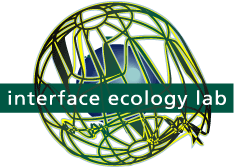 Digital game play is the human-computer interface in its purest form;
people play games in order to experience interfaces. My
research develops gameplay through which participants practice
real-life skills, with an emphasis on disaster-response contexts and
team coordination. My work incorporates ethnographic approaches to
understanding existing practice; zero-fidelity simulations that
capture abstract, human-centered aspects of practice; mixed reality
computing that engages players in human-human, human-environment, and
human-computer interaction; and mobile, collaborative technologies
that support sensemaking in disaster.
Digital game play is the human-computer interface in its purest form;
people play games in order to experience interfaces. My
research develops gameplay through which participants practice
real-life skills, with an emphasis on disaster-response contexts and
team coordination. My work incorporates ethnographic approaches to
understanding existing practice; zero-fidelity simulations that
capture abstract, human-centered aspects of practice; mixed reality
computing that engages players in human-human, human-environment, and
human-computer interaction; and mobile, collaborative technologies
that support sensemaking in disaster.
My research thus lies in and around the intersection of human-computer interaction, games, mixed reality, and disaster response. Further research interests include serious gaming, game mechanic design, sensor-driven interfaces, team coordination, ethnographic approaches, and signal processing. My dissertation and ongoing research project involves working on the Team Coordination Game (TeC). TeC iteratively develops zero-fidelity, non-mimetic simulation mixed reality game designs for studying and enhancing the team coordination capabilities of emergency responders. An ethnographic study with the Brayton Fire Training Facility informs the designs. Game user studies with fire emergency response students evaluate its effectiveness for teaching team coordination. A component of TeC research develops an ergonomic wearable computing platform with head-mounted display, orientation and location sensors, and radio communication.
I have previously done research and engineering at the Texas A&M Center for Applied Technology working on information dashboard interfaces, and the TEEX / TEES Crisis Response Innovative Technologies Lab (at the Disaster City Emergency Ops Training Center), where I worked in disaster sensemaking. I maintain a research relationship with my advisor, Andruid Kerne, at the Interface Ecology Lab. I previously interned at the Yahoo! Research Internet Experiences Group with Elizabeth Churchill and Ayman Shamma investigating the use of mobile devices in shopping.
publications, presentations, exhibitions
 Toups Dugas, P. O., Kerne, A., Hamilton, W. A.
The Team Coordination Game: A zero-fidelity simulation abstracted from fire emergency response work practice,
ACM Transactions on Computer-Human Interaction (ToCHI) 18, 4, 2011, 37 pages, [DOI:10.1145/2063231.2063237].
Toups Dugas, P. O., Kerne, A., Hamilton, W. A.
The Team Coordination Game: A zero-fidelity simulation abstracted from fire emergency response work practice,
ACM Transactions on Computer-Human Interaction (ToCHI) 18, 4, 2011, 37 pages, [DOI:10.1145/2063231.2063237]. Toups Dugas, P. O., Kerne, A., Hamilton, W.
Game Design Principles for Engaging Cooperative Play: Core Mechanics and Interfaces for Non-Mimetic Simulation of Fire Emergency Response,
Proc ACM SIGGRAPH Games 2009,
New Orleans, Louisiana, USA, August 3–7, 2009, 71–78, [DOI:10.1145/1581073.1581085].
Toups Dugas, P. O., Kerne, A., Hamilton, W.
Game Design Principles for Engaging Cooperative Play: Core Mechanics and Interfaces for Non-Mimetic Simulation of Fire Emergency Response,
Proc ACM SIGGRAPH Games 2009,
New Orleans, Louisiana, USA, August 3–7, 2009, 71–78, [DOI:10.1145/1581073.1581085].
 Hamilton, W., Toups Dugas, P. O., Kerne, A.
Synchronized Communication and Coordinated Views: Qualitative Data Discovery for Team Game User Studies,
Ext Abs ACM Computer Human Interaction 2009,
Boston, Massachusetts, USA, April 4–9, 2009, 4573–4578, [DOI:10.1145/1520340.1520702].
Hamilton, W., Toups Dugas, P. O., Kerne, A.
Synchronized Communication and Coordinated Views: Qualitative Data Discovery for Team Game User Studies,
Ext Abs ACM Computer Human Interaction 2009,
Boston, Massachusetts, USA, April 4–9, 2009, 4573–4578, [DOI:10.1145/1520340.1520702].
